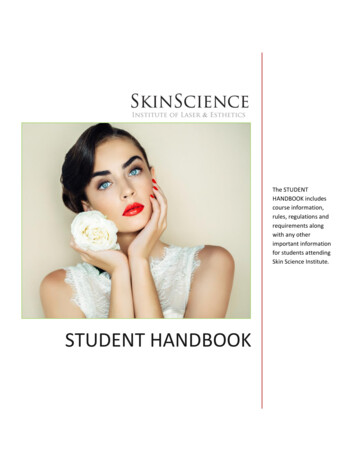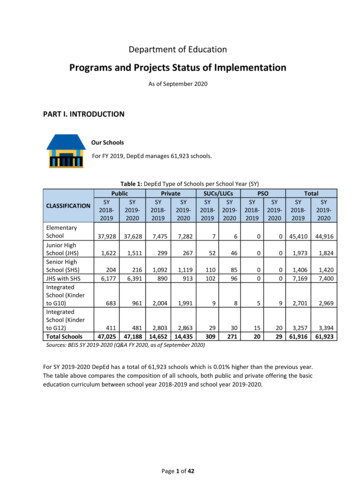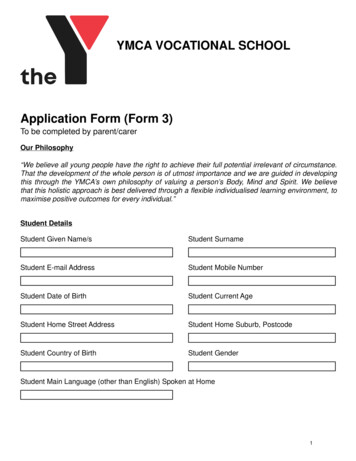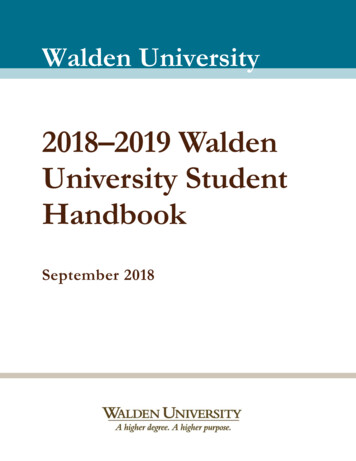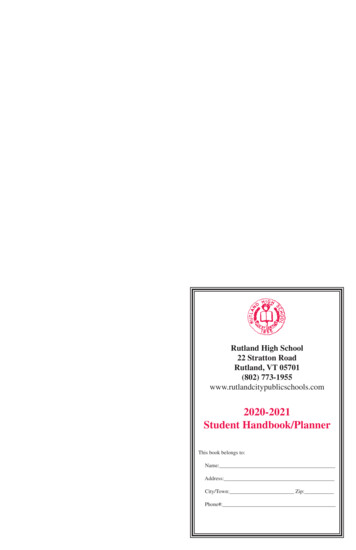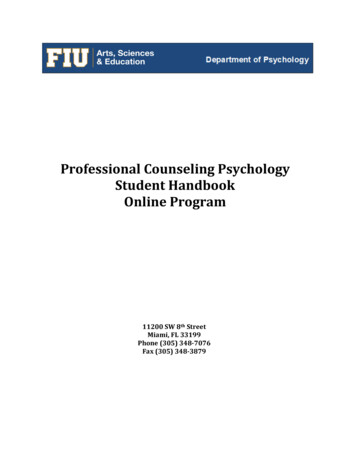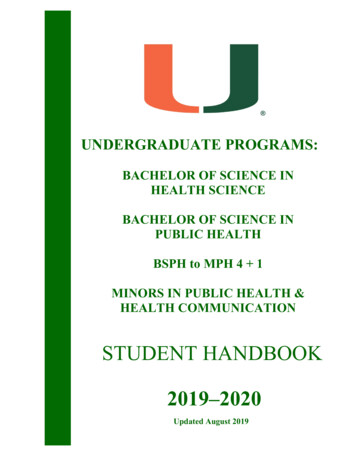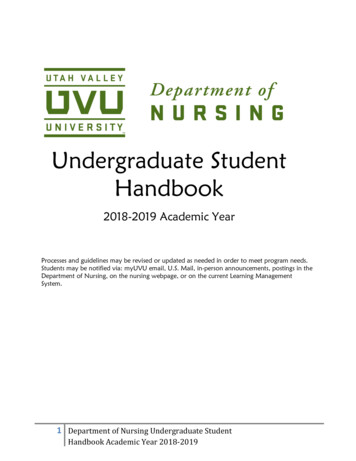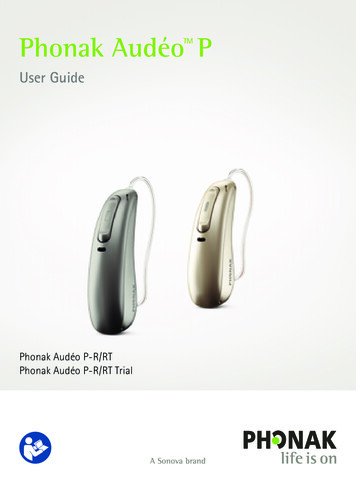
Transcription
2019-2020STUDENT HANDBOOK ANDACADEMIC CATALOG
HANDBOOKTHE UNIVERSITY . 6THE SCHOOL OF NURSING MISSION AND VALUES . 9SCHOOL OF NURSING FACILITIES AND CENTERS . 112019 – 2020 ACADEMIC CALENDAR . 13ACADEMIC ADVISING . 15ACADEMIC INTEGRITY POLICY . 15ACADEMIC STANDARDS FOR PROGRESSION . 23ACADEMIC SUCCESS CENTER . 24ADMISSION . 24ALUMNI . 28ATHLETICS AND RECREATION. 29ATTENDANCE POLICY . 29BLACKBOARD . 30CAREER LAB . 31CLINICAL PLACEMENTS . 32CLINICAL WARNINGS. 32COMPLAINT/GRIEVANCE POLICY. 33COMPLIANCE . 34CONTINUOUS ENROLLMENT POLICY . 34COURSE DROP OR WITHDRAWAL POLICY . 34COURSE LISTINGS AND SCHEDULE . 35COURSE REFUND POLICY . 35COURSE WARNINGS . 36CREDIT HOUR POLICY. 36CRIMINAL CONDUCT POLICY . 37DISABILITY SUPPORT SERVICES . 37EMAIL ACTIVATION . 38EXAMINATION POLICY. 38FINANCIAL AID . 39GRADING POLICY . 47GRADUATION . 48HEALTH INSURANCE FOR STUDENTS. 49HOUSING . 49ID BADGES . 50INCLEMENT WEATHER INFORMATION. 50INCOMPLETE COURSEWORK . 50INDEPENDENT STUDY POLICY . 51INSPECTION OF ACADEMIC RECORDS . 51INTERNATIONAL SERVICES . 52INVOLUNTARY LEAVE OF ABSENCE . 52LEAVE OF ABSENCE . 54LETTERS OF RECOMMENDATION . 55LIBRARY RESOURCES AND SERVICES . 562019-2020 School of Nursing Handbook and Catalog
LOCKERS . 56NCLEX . 56NEW CHILD ACCOMMODATIONS FOR FULL-TIME GRADUATE STUDENTS AND POSTDOCTORAL TRAINEES.57NON-DEGREE-SEEKING STUDENTS . 58NOTIFICATION OF MISSED CLINICAL TIME . 58PARKING AND TRANSPORTATION INFORMATION . 59PERSONAL RELATIONSHIPS POLICY . 59PHOTOGRAPHY AND FILM RIGHTS POLICY . 59PREREQUISITES FOR HEALTH PROFESSIONS . 60PRINTING AND COPYING . 61PROFESSIONAL ATTIRE POLICY . 61PROFESSIONAL ETHICS POLICY . 63REGISTRATION POLICIES AND PROCEDURES . 70RELIGIOUS OBSERVANCE ATTENDANCE POLICY . 71SCHOLARSHIPS, AWARDS, AND FUNDS . 72SERVICE AND ASSISTANCE ANIMAL POLICY . 92SIGMA THETA TAU . 92SIS (STUDENT INFORMATION SYSTEM) . 93SOCIAL SECURITY NUMBER PROTECTION AND USE. 93SOURCE. 93STUDENT ACCOUNTS . 95STUDENT AFFAIRS . 96STUDENT ASSISTANCE PROGRAM (JHSAP) . 96STUDENT CLUBS AND ORGANIZATIONS . 97STUDENT CODE OF CONDUCT. 97TECHNICAL STANDARDS FOR ADMISSION AND GRADUATION . 98TEXTBOOK INFORMATION . 99TOBACCO-FREE POLICY . 100TRANSCRIPTS AND ENROLLMENT VERIFICATIONS. 100TRANSFER OF GRADUATE CREDIT . 100TUITION AND FEES . 101UNIVERSITY HEALTH SERVICES . 103VETERANS ASSISTANCE . 104JOHNS HOPKINS UNIVERSITY POLICIES. 106 ADA Compliance and Disability AccommodationsAlcohol Abuse and Drug Free WorkplaceCampus Safety and SecurityFamily Education Rights and PrivacyHarassment and DiscriminationInformation TechnologyPolicy Addressing Campus ViolencePossession of Firearms on University PremisesSexual MisconductStudent Conduct Code2019-2020 School of Nursing Handbook and Catalog
DEGREES AND CERTIFICATESMASTER’S DEGREES . 108MASTER OF SCIENCE IN NURSING (MSN) ENTRY INTO NURSING PROGRAM . 109MASTER OF SCIENCE IN NURSING (MSN) SPECIALTY TRACKS . 112MASTER OF SCIENCE IN NURSING (MSN) HEALTH SYSTEMS MANAGEMENT TRACK . 113MASTER OF SCIENCE IN NURSING (MSN) ADVANCED PRACTICE TRACK: HEALTH SYSTEMSMANAGEMENT/CLINICAL NURSE SPECIALIST, ADULT- GERONTOLOGICAL CRITICAL CARE. 115MASTER OF SCIENCE IN NURSING (MSN) ADVANCED PRACTICE TRACK: HEALTH SYSTEMSMANAGEMENT/CLINICAL NURSE SPECIALIST, ADULT- GERONTOLOGICAL HEALTH . 118CERTIFICATES . 121NURSE EDUCATOR CERTIFICATE. 122PEDIATRIC ACUTE CARE NURSE PRACTITIONER CERTIFICATE . 123PSYCHIATRIC MENTAL HEALTH NURSE PRACTITIONER CERTIFICATE . 124DOCTORAL DEGREES. 125DOCTOR OF NURSING PRACTICE (DNP) . 126DOCTOR OF NURSING PRACTICE (DNP) ADVANCED PRACTICE TRACKS . 127DOCTOR OF NURSING PRACTICE (DNP) ADVANCED PRACTICE TRACK: ADULT-GERONTOLOGICALACUTE CARE NURSE PRACTITIONER . 129DOCTOR OF NURSING PRACTICE (DNP) ADVANCED PRACTICE TRACK: ADULT-GERONTOLOGICALPRIMARY CARE NURSE PRACTITIONER . 131DOCTOR OF NURSING PRACTICE (DNP) ADVANCED PRACTICE TRACK: FAMILY PRIMARY CARENURSE PRACTITIONER. 134DOCTOR OF NURSING PRACTICE (DNP) ADVANCED PRACTICE TRACK: PEDIATRIC PRIMARY CARENURSE PRACTITIONER. 143DOCTOR OF NURSING PRACTICE (DNP) ADVANCED PRACTICE TRACK: ADULT-GERONTOLOGICALCRITICAL CARE CLINICAL NURSE SPECIALIST. 146DOCTOR OF NURSING PRACTICE (DNP) ADVANCED PRACTICE TRACK: ADULT-GERONTOLOGICALHEALTH CLINICAL NURSE SPECIALIST . 149DOCTOR OF NURSING PRACTICE (DNP) ADVANCED PRACTICE TRACK: PEDIATRIC CRITICAL CARECLINICAL NURSE SPECIALIST. 152DOCTOR OF NURSING PRACTICE (DNP) EXECUTIVE TRACK. 155DOCTOR OF PHILOSOPHY IN NURSING (PHD). 158DUAL AND JOINT DEGREES . 171MASTER OF SCIENCE IN NURSING (MSN) HEALTH SYSTEMS MANAGEMENT/MASTER OF BUSINESSADMINISTRATION (MBA), DUAL DEGREE . 172MASTER OF SCIENCE IN NURSING (MSN) PUBLIC HEALTH NURSING/MASTER OF PUBLIC HEALTH(MPH) JOINT DEGREE . 175MASTER OF SCIENCE IN NURSING (MSN) ADULT- GERONTOLOGICAL PRIMARY CARE NURSEPRACTITIONER/ MASTER OF PUBLIC HEALTH (MPH) JOINT DEGREE . 179MASTER OF SCIENCE IN NURSING (MSN) ADULT- GERONTOLOGICAL PRIMARY CARE NURSEPRACTITIONER WITH HIV CERTIFICATE/MASTER OF PUBLIC HEALTH JOINT DEGREE . 183MASTER OF SCIENCE IN NURSING (MSN) FAMILY PRIMARY CARE NURSE PRACTITIONER/MASTEROF PUBLIC HEALTH (MPH) JOINT DEGREE . 1882019-2020 School of Nursing Handbook and Catalog
DOCTOR OF NURSING PRACTICE (DNP): ADVANCED PRACTICE TRACK/DOCTOR OF PHILOSOPHY INNURSING (PHD) DUAL DEGREE . 192DOCTOR OF NURSING PRACTICE - EXECUTIVE (DNP EXECUTIVE)/MASTER OF BUSINESSADMINISTRATION (MBA) DUAL DEGREE . 208COURSE CATALOG . 210JOHNS HOPKINS UNIVERSITY ADMINISTRATION AND SCHOOL OF NURSING LEADERSHIP 247PRESIDENT’S CABINET . 248DEANS AND DIRECTORS . 249SCHOOL OF NURSING LEADERSHIP . 250JOHNS HOPKINS UNIVERSITY BOARD OF TRUSTEES . 251EMERITUS TRUSTEESROBERT J. ABERNETHY . 2522019-2020 School of Nursing Handbook and Catalog
HANDBOOK2019-2020 School of Nursing Handbook and Catalog
THE UNIVERSITYSince its founding in 1876, Johns Hopkins University has been at the forefront of higher education. Establishedas an institution oriented toward graduate study and research, it has often been called America’s first trueuniversity.Today, Johns Hopkins’ commitment to academic excellence continues in its nine degree-granting divisions: theschools of Nursing, Medicine, Public Health, Arts and Sciences, Engineering, Business, Education, AdvancedInternational Studies, and the Peabody Institute.The Johns Hopkins University is the smallest of the top-ranked universities in the United States and, by its ownchoice, remains small. A distinguished learning institution, Johns Hopkins provides a unique environment forstudents and faculty. Its impact continues to be felt worldwide.The East Baltimore CampusThe School of Nursing, the School of Medicine, the Bloomberg School of Public Health, the Welch MedicalLibrary of the University, and Johns Hopkins Hospital are often referred to as the Johns Hopkins MedicalInstitutions.School of NursingJohns Hopkins University, in affiliation with three Baltimore-based hospitals—Church, Johns Hopkins, andSinai— formed the Consortium for Nursing Education Inc. in the spring of 1983. The Consortium, a unique modelfor nursing education, established the Johns Hopkins School of Nursing with the first class of undergraduatesadmitted in September 1984.The Johns Hopkins School of Nursing offers a pre-licensure Master of Science in Nursing (MSN) Entry intoNursing program, MSN specialty programs, and doctoral programs, as well as post-degree options. The School ofNursing prepares students for professional nursing practice through an educational process that combines astrong academic curriculum with intensive clinical experience. Programs are built on the University’scommitment to research, teaching, patient service, and educational innovation. The school’s mission is toeducate professional nurses to participate in all aspects of health care and to prepare them academically andtechnologically for challenges of the future.Nursing students at Johns Hopkins University will be working side by side with some of the brightest scholars inthe world. The outstanding resources of the University provide students with a unique opportunity to developand grow in the nursing profession. It is this rare combination of resources and a broad range of nursingopportunities that makes the Johns Hopkins School of Nursing a progressive leader in today’s nursing education.School of MedicineThe School of Medicine seeks to educate practitioners who have a strong background in the underlying medicalsciences and also to foster the development of teachers of medicine and medical investigators. The course ofinstruction is based on a core of required basic sciences and clinical courses, supplemented with ample electivetime for special advanced study. Elective courses are described in the programs of the various departments inthe section on Departments, Divisions, Centers, and Subjects of Instruction.2019-2020 School of Nursing Handbook and Catalog6
Bloomberg School of Public HealthThe Johns Hopkins Bloomberg School of Public Health is the oldest and largest school of public health in theworld (est. 1916). As a leading international authority on public health, the Bloomberg School is dedicated toprotecting health and saving lives. Every day, the school works to keep millions around the world safe fromillness and injury by pioneering new research, deploying its knowledge and expertise in the field, and educatingtomorrow’s scientists and practitioners in the global defense of human life. The school’s various academicdepartments offer graduate training in the private and public sectors pertaining to public health and its relatedsciences. The School of Nursing and the School of Public Health have a joint MSN/MPH program.Homewood CampusZanvyl Krieger School of Arts and SciencesFounded in 1876, the Zanvyl Krieger School of Arts and Sciences is recognized for excellence in research andeducation in the natural sciences, social sciences, and humanities. The school’s research mission infuses itsundergraduate, graduate, and postdoctoral programs with unique opportunities for students to not only pursuelearning in the classroom but also participate actively in research. Largely free of university-wide curricularrequirements, undergraduate students, in concert with faculty, shape programs to meet their academicobjectives and may choose from 39 departmental or area majors. Many undergraduates engage in research,undertake independent study and internships, and pursue advanced course work. Graduate students planprograms with faculty mentors to explore and master their areas of interest. Research teams comprised offaculty, postdoctoral associates, graduate students, and undergraduates are customary in all disciplines.Whiting School of EngineeringEngineering began at Johns Hopkins in 1913 and was designed to couple a professional education with significantexposure to liberal arts and scientific inquiry. In 1979, the University underscored its commitment toengineering distinction by establishing the Whiting School of Engineering as a separate division of theHomewood campus. The school awards bachelor’s, master’s, and doctoral degrees, and offers instruction inmany departments, including Biomedical Engineering, run jointly by the schools of Engineering and Medicine.The school’s Engineering for Professionals programs are among the largest of their kind in the country, offeringpart-time master’s degrees to the professional engineering community.Other Academic DivisionsCarey Business SchoolThe Johns Hopkins Carey Business School, AACSB-accredited, brings to the field of business education theintellectual rigor and commitment to excellence that are the hallmarks of Johns Hopkins University. It offers auniquely humanistic and multidisciplinary model of business education and research, tapping the rich resourcesof faculty and programs from the other great divisions of the university—the schools of Medicine, Public Health,Nursing, Engineering, Advanced International Studies, Arts and Sciences, and Education. Through programs thatcombine extensive theory with a wealth of work-world experience, Carey students learn from nationallyrecognized researchers and leaders in their fields. Faculty are a dynamic blend of academic experts andpractitioners drawn from leading corporate, government, and nonprofit institutions, such as Bank of America,Deloitte, Fannie Mae, NASDAQ, Northrop Grumman, the U.S. Treasury, Wells Fargo, and the World WildlifeFund. By linking this focused business education to urgent social issues— e.g., health, security, infrastructure,education, environmental sustainability, population, and poverty— the Johns Hopkins Carey Business Schoolendeavors to improve lives on a global scale by producing leaders to tackle not only today’s most difficultchallenges but those of tomorrow as well.2019-2020 School of Nursing Handbook and Catalog7
School of EducationThe School of Education at Johns Hopkins University has a long history of providing innovative academicprograms and applied research that have measurably improved the quality of PK-12 education, especially in themost challenged urban schools. This blend of quality and responsiveness has led to strong partnerships withschool systems, other Johns Hopkins schools, national professional organizations, and governmental agencies.The School of Education houses two distinctive research and development centers: the Center for Research andReform in Education and the Center for Technology in Education. The School of Education awards approximately500 master’s degrees, as well as offering undergraduate, graduate certificate, and doctoral degree programs. Itis home to more than 2,000 students, 58 full-time faculty, and approximately 30 research and professional staff.Peabody InstituteThe Institute, on historic Mt. Vernon Square in central Baltimore, is recognized as one of the foremostprofessional schools of music in the country. It was founded in 1857 by philanthropist George Peabody.The Paul H. Nitze School of Advanced International StudiesSAIS, in Washington, DC, provides graduate-level programs in the field of international studies, as well asscholarly research relevant to the problems of the United States and its public and private institutions in theirrelations with the governments and institutions of other countries. The school operates two centers abroad—one in Bologna, Italy, and one in Nanjing, China.Applied Physics LaboratoryThe Applied Physics Laboratory in Laurel, MD, conducts research and development to enhance the security ofthe nation through the application of science and technology. The laboratory is also committed to technologydevelopment in space science and carries on important work in biomedicine and education that is synergisticwith the University as a whole. APL seeks to make critical contributions to critical challenges primarily forsponsors in the Department of Defense, NASA, and other government agencies. Laboratory programs inbiomedicine are often conducted in collaboration with other University divisions and include such examples assystems for global telemedicine and home health care, sensors for space travel, and prostate cancer detection.The laboratory staff consists of over 3,300 engineers, scientists, and supporting staff.Research InstitutesAdditional research institutes within or associated with the University include the Institute for Policy Studies,which conducts research on urban planning; the Center for Social Organization of Schools, which conducts majorresearch on desegregation and other school issues; the Krieger Mind/Brain Institute, which investigates therelationship between mental processes and the structure and functioning of the brain; the Space TelescopeScience Institute, the ground station for NASA’s Space Telescope; and the Center for Talented Youth, whichidentifies gifted young students and helps them to develop as independent, self-motivated learners.Other Continuing Education Opportunities at HopkinsJohns Hopkins plays a vital role in lifelong learning by extending its rich and varied resources to the region’sadult community. The University continues to meet the educational needs of working men and women—healthpractitioners, engineers, educators, scientists, and business professionals—who are seeking expanded skills,new credentials, career advancement, and an enhanced quality of life. Through the nine degree-grantingdivisions of the University—the schools of Arts and Sciences, Business, Education, Engineering, Medicine,Nursing, Public Health, Advanced International Studies, and the Peabody Institute—Hopkins providesprofessional development, graduate study, accreditation, and personal enrichment opportunities for adult parttime students.2019-2020 School of Nursing Handbook and Catalog8
THE SCHOOL OF NURSINGMISSION AND VALUESThe mission of the Johns Hopkins School of Nursing is to improve the health of individuals and diversecommunities locally and globally through leadership and excellence in nursing education, research, practice, andservice.The academic rigor of our programs, the extraordinary nursing scholarship of our faculty, and our reputation forshaping nursing graduates who are leaders in their profession position us as one of the top nursing schools inthe U.S.Our 2020 Strategic PlanAs we move toward 2020, the Johns Hopkins School of Nursing has continued to focus on areas that have longdistinguished it among its peers and positioned us for thought leadership, enacting our mission, and modelingour values. Our five main goals are below, aligned with Johns Hopkins University’s Ten by Twenty priorities.1. Foster Collaboration and Interprofessional Education, Practice, Research and PolicyThe entire Hopkins Nursing community has worked to build new relationships and expand ournetworks so that interdisciplinary teams can improve not just the quality but value of healthcare locally and globally.2. Model Excellence in Research, Scholarship, Teaching and PracticeWe share ideas and contribute to an environment that fosters creativity and innovation. We arebuilding an organizational structure and processes that develop a strong and qualified pipelineof employees, both faculty and staff.3. Advance and Support a School Culture that Promotes Diversity and InclusionWe
for nursing education, established the Johns Hopkins School of Nursing with the first class of undergraduates admitted in September 1984. The Johns Hopkins School of Nursing offers a pre-licensure Master of Science in Nursing (MSN) Entry into Nursing program, MSN specialty programs, and doctoral programs, as well as post-degree options.
